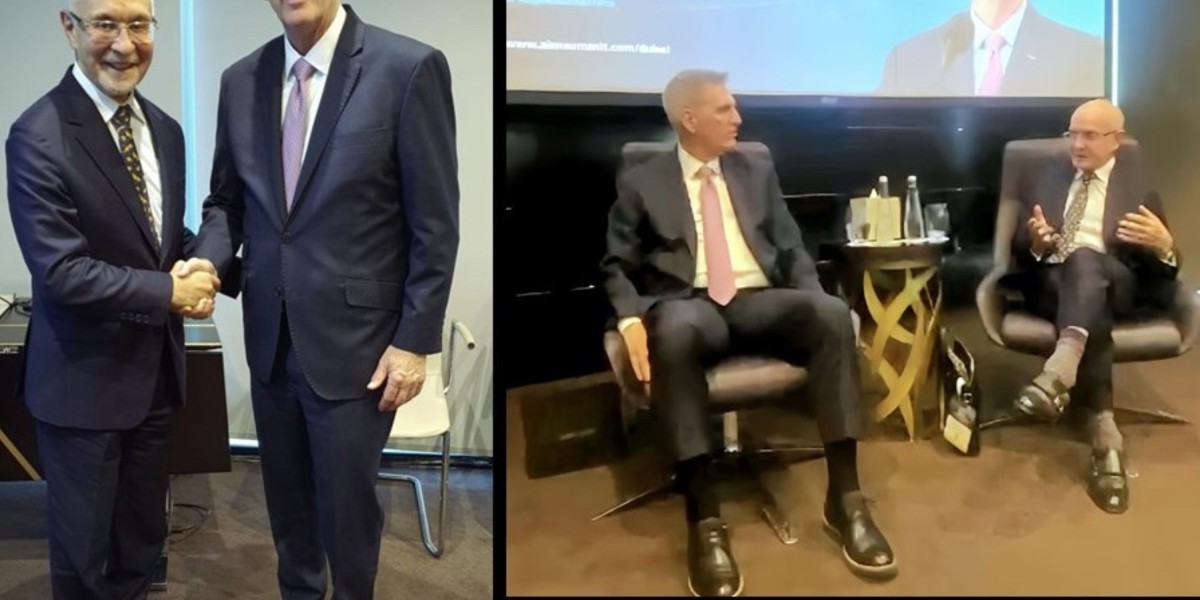The AIM Summit Dubai roundtable with Kevin McCarthy brought together influential leaders, policymakers, and investors to address some of the most pressing challenges shaping the global economic landscape. As one of the keynote speakers, McCarthy offered sharp perspectives on sovereign debt, political polarization, cross-party collaboration, and the future of emerging markets. His insights not only resonated with financial experts but also highlighted the broader implications of leadership and decision-making in today’s turbulent geopolitical environment.
Kevin McCarthy Global Sovereign Debt Insights
A central theme of the discussion was sovereign debt at AIM Summit Dubai. McCarthy emphasized that rising debt levels in both developed and emerging economies pose long-term risks to financial stability. He pointed out that unchecked borrowing and mounting fiscal deficits are not just economic concerns—they carry significant geopolitical consequences. Nations struggling with debt repayment often face reduced influence on the global stage, reliance on external aid, and diminished investor confidence.
His global sovereign debt insights stressed the importance of fiscal responsibility, transparent governance, and innovative strategies to restructure debt in ways that ensure stability while fostering growth. By drawing on historical parallels, McCarthy illustrated how debt crises have reshaped global power balances in the past and may do so again in the future.
Global Economic Insights by Kevin McCarthy
During the Dubai leadership forum featuring Kevin McCarthy, he delivered a comprehensive analysis of the global economy. He explored how inflationary pressures, disrupted supply chains, and tightening monetary policies by central banks continue to influence investment flows. McCarthy argued that leaders must balance short-term financial remedies with long-term structural reforms to achieve sustainable growth.
These global economic insights by Kevin McCarthy provided clarity for investors navigating volatile markets. He also stressed the role of innovation, digital transformation, and green energy transitions in driving future economic resilience. By connecting economic theory with actionable leadership, McCarthy positioned himself as a bridge between policy discussions and business decision-making.
Emerging Market Trends at AIM Summit
Another significant highlight of the roundtable was the discussion on emerging market trends at AIM Summit. McCarthy underscored how these regions, despite their volatility, present immense opportunities for growth and investment. With rising middle-class populations, rapid urbanization, and expanding digital economies, emerging markets are becoming engines of global development.
However, McCarthy also cautioned about the vulnerabilities these markets face—ranging from debt dependency to political instability. He called for international collaboration to ensure that these economies can thrive while maintaining resilience against external shocks. Investors, according to McCarthy, must weigh both the opportunities and risks when engaging with emerging markets.
Kevin McCarthy on Cross-Party Collaboration
In a political climate marked by polarization, McCarthy highlighted the urgent need for cross-party collaboration. At the Kevin McCarthy roundtable on global economy, he reflected on how bipartisan approaches can foster stability and long-term economic planning. Whether it’s debt management, climate change, or foreign policy, he noted that sustainable solutions require cooperation across ideological divides.
McCarthy’s remarks on cross-party collaboration struck a chord with both political and business leaders. His argument was simple yet profound: global challenges cannot be solved in silos. Instead, partnerships—whether between governments, parties, or industries—are key to building a resilient global economy.
Kevin McCarthy Geopolitical Trends Dubai
At the AIM Conference in Dubai, McCarthy also delved into geopolitical trends shaping the international order. From shifting alliances in the Middle East to growing competition between the U.S. and China, he emphasized that economic policy cannot be separated from geopolitical realities.
These Kevin McCarthy geopolitical trends Dubai insights underlined how diplomacy, security, and trade agreements all intersect with sovereign debt and economic growth. Leaders, he argued, must adopt a holistic view of global affairs to remain competitive and prepared for future uncertainties.
Kevin McCarthy Insights from AIM Conference – Key Takeaways
The Kevin McCarthy insights from AIM Conference were not just theoretical but deeply practical. He encouraged businesses and policymakers alike to adopt forward-looking strategies. His key takeaways included:
Sovereign debt requires innovative restructuring mechanisms.
Political polarization must be addressed with bipartisan solutions.
Emerging markets hold the key to future global growth, but resilience is vital.
Geopolitical shifts demand flexible leadership and adaptable strategies.
Collaboration across nations, parties, and industries is the foundation of progress.
Conclusion – Kevin McCarthy’s Global Leadership Vision
The Dubai leadership forum featuring Kevin McCarthy provided a platform for deep reflection on how nations, businesses, and leaders can navigate a complex and uncertain future. His speeches tied together critical threads—sovereign debt, emerging markets, geopolitical shifts, and collaboration—into a cohesive vision for global leadership.
In an age of uncertainty, McCarthy’s voice at the AIM Summit Dubai roundtable with Kevin McCarthy reinforced the importance of resilience, unity, and forward-thinking policies. His ability to bridge political, economic, and global perspectives ensures his insights will continue to shape conversations on leadership and stability in the years ahead.






